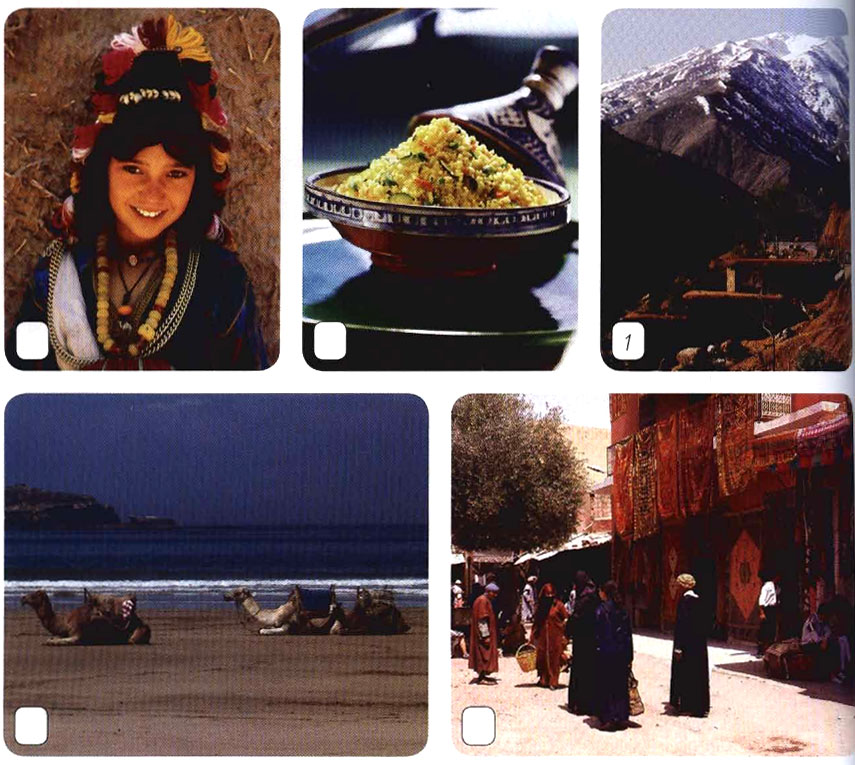Listening task 1: Information
A Listen. People are talking about Morocco. What are the topics? Number the pictures from 1 to 4. (There is one extra picture.)

Answer & Audioscripts
(top row) X, 2, 1
(bottom row) 4, 3
Audioscripts in B below
B Listen again. Circle the correct answers.
1 The highest point in northern Africa is
a. 467 meters.
b. 4,167 meters.
2 Moroccans use their right hands
a. for eating.
b. for greeting.
3 Older Moroccans often shake hands and then touch
a. their heads.
b. their hearts.
4 At night, tourists camp
a. on the beach.
b. in a village.
Answer & Audioscripts
1 b 2 a 3 b 4 a
Audioscripts
1
Woman: Located in North Africa, Morocco is a popular tourist destination. Morocco is known for its beautiful beaches, but it also has deserts, rivers, and tall, snowy mountains. The Atlas Mountains are located in the middle of Morocco and are the tallest mountains in the region. In fact, the highest point in northern Africa is Mount Toubkal. It’s four thousand one hundred and sixty-seven meters tall.
2
Man: It’s no wonder Moroccan restaurants can be found around the world. The food in Morocco is delicious. Traditional dishes usually include meat or fish and vegetables. Couscous, a dish similar to pasta, is probably the most well known. It is common for Moroccans to eat with their fingers, but only the right hand is used for eating.
3
Woman: Shaking hands is a common greeting in Morocco, and people there shake hands when they greet friends, as well as when they meet someone new. After shaking hands, older Moroccans often touch their hearts with their right hands. This gesture is a sign of warmth and friendship.
4
Man: There are lots of interesting things to see and do for visitors to Morocco. The western coast of the country along the Atlantic Ocean offers some of the best scenery. Tourists looking for a truly unique experience can take a trekking tour along the coast on camel back. On the tour, visitors can see beautiful ocean views and visit fishing villages by day, and by night they can stop to camp on the sandy beaches.
Listening task 2: Languages
A Listen. A woman is talking about languages in Morocco. Number the languages from 1 to 5. (There is one extra language.)
___ standard Arabic
___ English
___ Moroccan Arabic
___ French
_1_ Berber
___ Spanish
Answer & Audioscripts
1 Berber 2 Moroccan Arabic
3 standard Arabic 4 French 5 English
Audioscripts in B below
B Listen again. Which languages from Exercise A does the woman use in each situation? Number the situations from 1 to 5. (There is one extra situation.)
___ reading literature
___ reading the newspaper
___ singing traditional songs
___ speaking with friends
_1_ speaking with relatives
___ studying at the university
Answer & Audioscripts
1 Berber, speaking with relatives
2 Moroccan Arabic, speaking with friends
3 standard Arabic, reading the newspaper
4 French, studying at the university
5 English, reading literature
Audioscripts
1
Interviewer: Bahija, you grew up in Morocco, right? I know many Moroccans speak more than one language. How many languages do you speak?
Bahija: Oh, a lot, I guess… not all perfectly, of course.
Interviewer: What language do you speak at home?
Bahija: Well, my family is Berber – from the south of Morocco. So I speak Berber at home with them.
Interviewer: Do you speak Berber at school, too?
Bahija: No. These days I just speak it when I go home to visit relatives.
2
Interviewer: But you speak Arabic, too, right?
Bahija: Yes, I do! But there are several kinds of Arabic, you know.
Interviewer: Several kinds?
Bahija: Yes. There is Moroccan Arabic, from Morocco, of course. That’s the language I use with most of my friends.
Interviewer: Is it different from other kinds of Arabic?
Bahija: In some ways, yes. Some of the vocabulary is different, and the accent is a little different. Also, Moroccan Arabic is mostly a spoken language, not written.
3
Interviewer: So there are no newspapers in Moroccan Arabic?
Bahija: Very few. When I read the newspaper or watch TV, it’s in standard Arabic. It’s sort of a common Arabic. In most Arab countries, children learn to read and write it from a young age.
Interviewer: I see.
4
Interviewer: How about your university classes? What language do the professors use?
Bahija: My university classes are all in French. We listen to lectures in French and discuss in class in French.
Interviewer: Wow! That’s four languages! Berber, Moroccan Arabic, standard Arabic, and French.
5
Interviewer: And English makes five languages! So, why did you start studying English?
Bahija: Well, I was interested in literature, especially British literature. I wanted to study English so I could read English literature in the original language.
Interviewer: Well, with all that practice with language, it’s not surprising that you’re so good at English!
Bahija: Oh… Thank you!
Related Posts
- Practice Listening English Exercises for B1 – Hawaii
- Practice Listening English Exercises for B1 – Dreams
- Practice Listening English Exercises for B1 – Youth culture
- Practice Listening English Exercises for B1 – Personalities
- Practice Listening English Exercises for B1 – Stress and health
- Practice Listening English Exercises for B1 – Hungary
